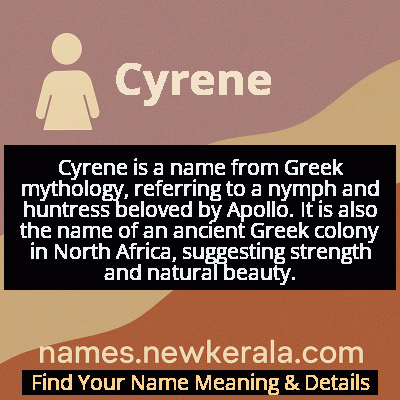Cyrene Name Meaning & Details
Origin, Popularity, Numerology Analysis & Name Meaning of Cyrene
Discover the origin, meaning, and cultural significance of the name CYRENE. Delve into its historical roots and explore the lasting impact it has had on communities and traditions.
Name
Cyrene
Gender
Female
Origin
Greek
Lucky Number
7
Meaning of the Name - Cyrene
Cyrene is a name from Greek mythology, referring to a nymph and huntress beloved by Apollo. It is also the name of an ancient Greek colony in North Africa, suggesting strength and natural beauty.
Cyrene - Complete Numerology Analysis
Your Numerology Number
Based on Pythagorean Numerology System
Ruling Planet
Neptune (Ketu)
Positive Nature
Intuitive, analytical, spiritual, and inquisitive.
Negative Traits
Secretive, reserved, aloof, and can be overly critical.
Lucky Colours
Green, yellow.
Lucky Days
Monday.
Lucky Stones
Cat’s eye, moonstone.
Harmony Numbers
1, 5, 6.
Best Suited Professions
Scientists, researchers, spiritual leaders, detectives.
What People Like About You
Depth of knowledge, analytical skills, spirituality.
Famous People Named Cyrene
Cyrene of Alexandria
Ancient Greek Philosopher
Student of Plato and influential female philosopher in ancient Greece
Cyrene (historical figure)
Founder Figure
Legendary figure associated with the founding of the ancient Libyan city of Cyrene
Cyrene (mythological)
Nymph/Huntress
Mortal lover of Apollo who bore him Aristaeus, known for her incredible strength and hunting prowess
Name Variations & International Equivalents
Click on blue names to explore their detailed meanings. Gray names with will be available soon.
Cultural & Historical Significance
The historical city of Cyrene, founded in 631 BCE in modern-day Libya, became one of the most important Greek colonies, known for its medical school, philosophers, and as a center of the Cyrenaic school of philosophy. The city's prosperity and cultural achievements lent additional weight to the name, connecting it to intellectual pursuit and colonial success. Throughout classical literature, Cyrene appears in works by Pindar and other poets as a symbol of heroic feminine virtue, bridging the gap between mortal achievement and divine recognition while representing Greek ideals of arete (excellence) in female form.
Extended Personality Analysis
Those bearing the name Cyrene typically exhibit a remarkable blend of strength, independence, and practical intelligence. Drawing from the mythological figure's characteristics, Cyrene-named individuals often demonstrate natural leadership abilities and a no-nonsense approach to problem-solving. They tend to be physically active and connected to the natural world, with an innate understanding of practical matters and survival skills. Their independence can manifest as self-reliance to the point of stubbornness, but this is typically balanced by deep loyalty to family and close friends.
Psychologically, Cyrene individuals often possess what ancient Greeks would call 'metis'—practical wisdom and cunning intelligence. They're quick thinkers who excel in crisis situations, much like their namesake who single-handedly battled a lion. There's often an earthy sensuality about them, combined with a straightforward honesty that others find refreshing. While they may not seek the spotlight, their competence and reliability naturally draw people to them for guidance and support. Their strength is not aggressive but protective, making them natural guardians of people and principles they value.
Modern Usage & Popularity
In contemporary naming practices, Cyrene remains an exceptionally rare choice that appeals to parents seeking mythological depth and distinctive sound. The name has never ranked in the top 1000 names in English-speaking countries, maintaining its status as an exclusive, educated choice. Recent years have seen a slight uptick in usage, particularly among parents with classical education backgrounds or those participating in the growing trend of mythological naming. The name finds particular resonance in academic communities, among classicists, and in families with Greek heritage seeking to honor their cultural roots while choosing an uncommon name. Its rarity ensures that bearers stand out, while its classical pedigree provides intellectual and cultural credibility. Modern Cyrenes often report that their name sparks conversations about mythology and history, creating natural opportunities to share their name's rich background and meaning.
Symbolic & Spiritual Meanings
Symbolically, Cyrene represents the powerful intersection of human capability and natural force, embodying themes of strength through competence rather than aggression. Her story symbolizes how exceptional human achievement can transcend mortal limitations and attract divine recognition. The name carries deep connections to protection and guardianship, as Cyrene defended her father's livestock, and to fertility and creation, as she became mother to Aristaeus, the god of practical arts and agriculture.
Metaphorically, Cyrene represents the bridge between wilderness and civilization, between raw nature and cultivated skill. Her transportation to Africa by Apollo symbolizes transformation through exceptional achievement and the creation of new beginnings in unfamiliar territory. The name also carries connotations of practical wisdom—the kind of intelligence that solves real-world problems rather than abstract philosophical questions. In a broader sense, Cyrene symbolizes the idea that true power comes from demonstrated capability rather than inherited status or position, making her an enduring symbol of meritocratic values and the transformative potential of individual excellence.

